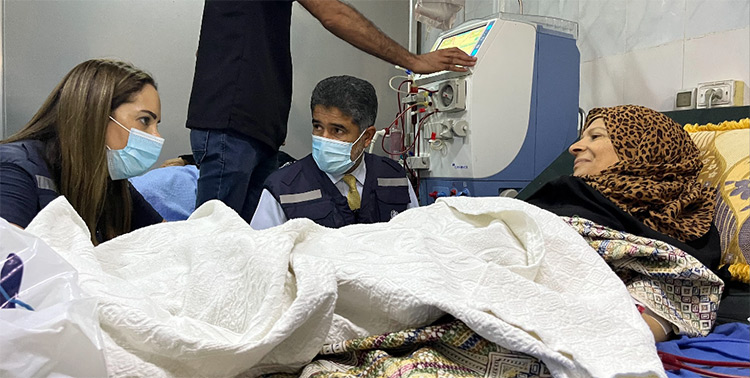
21 September 2022 – Over the past 3 days during my visit here in Damascus and to Daraa governorate, I have seen firsthand the devastating impact of war, economic instability and sanctions on innocent Syrians whose health even now continues to deteriorate.
In Daraa, once a hotspot of intense fighting and where parts of the governorate still remain in ruins, I met an elderly lady undergoing dialysis treatment who burst into tears as she spoke to me about her medical condition, and the fate that had befallen her country. Sobbing, she turned to me and asked, “What has happened to us?”
It was a hard question for me to answer.
Syrians who survived the war continue to be exposed to deadly disease outbreaks, like the current cholera outbreak across 6 governorates that has already claimed 23 lives and infected 253 people. Cases of leishmaniasis are also increasing across the country.
Today, more than 20 000 children under the age of 5 across Syria are malnourished, including 1500 children who are at risk of medical complications. No parent should have to stand by and watch their child suffer, but over the past 3 days, I met exhausted mothers whose babies were being treated for medical complications of malnutrition, including respiratory diseases and bloody diarrhoea as a result of weakened immunity.
In Damascus, doctors told me they were struggling to work with limited medical supplies and equipment as a result of sanctions on the country. Broken medical equipment like CT scanners and MRI machines stood idle as the spare parts needed to fix them could not be imported from international suppliers due to sanctions.
As WHO, we continue to reiterate that health care is a basic human right for all people, everywhere. But in Syria, the harsh reality is that our ability to ensure the health of innocent people is affected by other factors:
Political insecurity affects public health.
Sanctions affect public health.
Economic instability affects public health.
Shortages in fuel, water and electricity affect public health.
Unless the root causes of this health crisis are addressed, we can only achieve so much, leaving millions of people in Syria without the support they need to survive, recover and rebuild their country.
Within WHO’s regional vision of “Health for All by All” we call for solidarity and action from the international community to give the people of Syria a chance to live a life of dignity, well-being and good health.
Statement by WHO Representative on health situation in Syria
Today, the risks facing Syrians are greater than ever before, as just now highlighted by WHO’s Regional Director.
WHO’s Whole-of-Syria response approach allows us to provide health aid to all Syrians in need across the country using the best modality, regardless of geographical location or political affiliation. As an organization, we also coordinate with all levels of government and ruling parties to facilitate the access we need to ensure that no Syrian is left behind.
As part of our response to the current cholera outbreak, a shipment of medicines and supplies landed in Damascus airport from our logistics hub in Dubai just 2 days ago. These supplies, enough to cover 2000 severe cases and 190 000 mild cases, will be distributed to health facilities in northeast Syria where the outbreak is concentrated. A second shipment is also expected to arrive later today.
Our immediate priority now is to stop the spread of this deadly disease by continuing to support rapid response teams, expand surveillance, testing and contacting tracing, while raising awareness among affected and at-risk communities on how to protect themselves. We are also working with partners to test water quality and distribute chlorine tablets to affected communities.
Overall, our work in Syria takes a 3-pronged approach to: 1) address the immediate needs of more than 12 million people in need of health assistance; 2) restore health system functionality by supporting health facility recovery and rehabilitation efforts and ensuring the availability of enough skilled health professionals; and 3) address the social determinants that affect the health of Syrians with regards to water quality and access to fuel, electricity and other basic resources.
But ensuring the health and well-being of all Syrians goes beyond the responsibility of health authorities and WHO, and requires actions by other sectors and all stakeholders, including the Syrian people themselves who need to be more aware of the actions they need to take to protect themselves and others.
Only 15% of all Syrians are vaccinated against COVID-19, and coverage remains low among priority groups, such as health care workers and the elderly, increasing their risk of severe infection and hospitalization. WHO is working with partners to increase vaccine demand and raise awareness about the benefits of vaccines in interrupting transmission of the virus and preventing severe illness and hospitalization.
The people of Syria have endured more than 12 devastating years of conflict, losing their loved ones, their homes and their livelihoods. We owe it to them to help them preserve their most basic right: the right to health.


